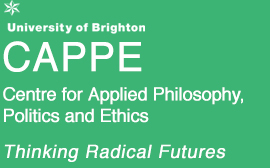17th Apr 2018 2:00pm-4:30pm
Grand Parade, G63

This workshop will be based on a draft paper in which I develop a critique of recent approaches to the so-called Anthropocene through the lens of Adorno’s reading of Beethoven’s late style. The popularisation of the term Anthropocene has been accompanied by the emergence of two seemingly opposed discourses. While both broadly endorse the basic diagnoses for which it stands, they answer in rather different ways: one response could be characterised in terms a promethean faith in science and the other as a turn towards ‘new materialism’. While the differences between those two discursive camps – based on the respective re-centring or de-centring of the ‘anthropos’ against the cypher of its limitations – could hardly be greater, they converge at the margins of their spectra of thinking: they both base their respective analyses of the dilemma and proposals for its solution on the assumption that the Anthropocene signifies a nature-culture continuum. It is at this point that Adorno’s work, and, in particular, his thinking on aesthetics can make an important intervention. For Adorno, the foregrounding of the historical (as opposed to ontological) reality of the distinction between history and nature is the driving force of critique. From an Adorno inspired perspective, the affirmation of a nature-culture continuum that would exist beyond its dominant historical articulation – which both ‘prometheanism’ and ‘new materialism’ rely on – conceals the negativity that emerges in the concrete non-coincidence of nature and history. This, in turn, forecloses not only the ability to reflect on the open contradictions and latent currents of late capitalist reality, but crucially also on the complicity of theory in them. A reading of Adorno’s interpretation of the works of the late Beethoven, which can be read as exemplars of natural-historical critique, will not only allow us to refine the critique of current Anthropocene discourses, but also show that the hope for emphatic transformation might emerge precisely in the non-coincidence of nature and history.
Antonia Hofstätter completed her PhD on the aesthetic dimensions of Adorno’s thinking at the School of Humanities at the University of Brighton in 2017. Antonia is currently preparing a post doc project on Adorno’s Übertragungen, for which she will investigate the logics of interpretation, intermediality and critique in his writing. She is a visiting scholar at CAPPE.